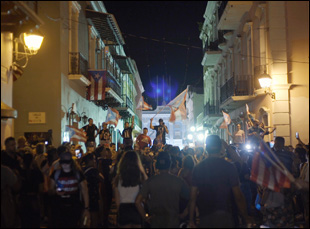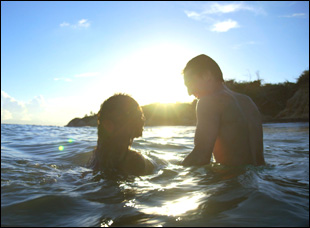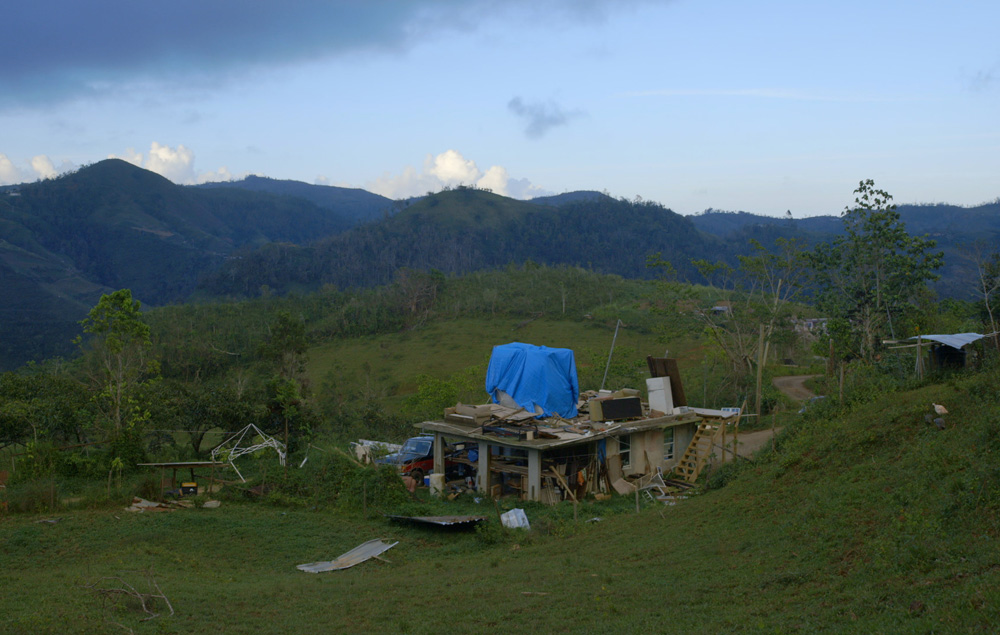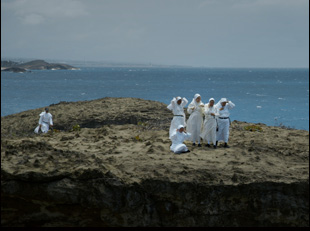As news coverage of Hurricane Maria emerged from Puerto Rico, where the category five storm had been wreaking incalculable damage to the commonwealth in the fall of 2017, Cecilia Aldarondo had been deeply dismayed for the obvious reasons, but there were others that had to do with the reporting itself.
“I think that documentarians sometimes make the mistake of thinking that the camera is going to solve everything,” says Aldarondo. “And when you’re dealing with trauma, sometimes sticking a camera in someone’s face is really unethical and it’s actually not going to yield the material you think it might.”
Aldrarondo has a habit of taking the long view, previously investigating the circumstances around her uncle’s death of AIDS 25 years after he passed in the harrowing “Memories of a Penitent Heart,” and behind the immediately devastating imagery of Puerto Ricans displaced from their homes and the horrifying details of the dysfunctional relief effort to get supplies to the island, the filmmaker knew that there was a predominant narrative taking shape built around pity, leaving out the inconvenient truth that the islanders had somehow found ways to survive in spite of systematic looting before and since its acquisition by America at the turn of the 20th century, and when the news cycle shifted to the next crisis, as it always tends to, the complicated aftermath was bound to be far more valuable to document than the immediate impact of the natural disaster when its implications were bound to be more lasting.
“Landfall,” Aldarondo’s remarkable second feature, travels all across Puerto Rico to bear witness to the fallout, from protests against the corruption-plagued administration of then-Governor Ricardo Rosselló to the farms hit hard by the hurricane, illuminating how the calamity exposed the flaws of an already broken system and a feeling of resistance on the part of residents that has become a resiliency over the years. However, with intricate work from editor Terra Jean Long and cinematographer Pablo Alvarez-Mesa, who is able to capture the contradictions of entire epochs in the island’s history within an single frame, Aldrarondo contextualizes the present by cutting to glimpses of the past and the proposed future, which start to look an awful lot like each other as real estate agents and cryptocurrency hawks seize on the chaos of newly unchartered territory to reshape it in ways that would only further marginalize the majority of locals who wouldn’t stand to benefit from their plans.
Moving beyond eliciting the instant reaction of sympathy, “Landfall” summons a broad array of emotions as it artfully conveys the many realities that co-exist for Puerto Ricans, who both deserve better yet stand strong and could thrive if they could have clarity and command over their own future, something they’ve never been afforded with their precarious status of having never been recognized as a state. Simply one of the year’s best films and one of its most prescient and far-reaching, considering the potential of the COVID-19 pandemic to reorganize societies around the world, the film is now streaming as part of DOC NYC through November 19th and Aldarondo graciously took the time to talk about how to accomplish such epic filmmaking on an intimate scale, recognizing the limits of her perspective even as a member of the Puerto Rican diaspora and prioritizing sensitivity to those featured in the film above all else.
It’s personal in origin because I’m Puerto Rican via diaspora, which means that I grew up outside of Puerto Rico. My parents left shortly before I was born and one of the consequences of that is having family in Puerto Rico at a distance and when the hurricane hit, I had this experience that many millions of Puerto Ricans outside Puerto Rico had of not knowing what was happening to my family, particularly my grandmother who was confined to a wheelchair at the time and she needed 24-hour care. So I had this horrible double experience of on the one hand, having this blackout of information, not knowing how my family was doing, and on the other being bombarded with immediate images of the hurricane and those images were really unsatisfying.
There’s almost a disaster playbook for how the media attempts to cover these things and very often it’s the same images of flooding and downed trees and people waiting in line for aid. I was really feeling like the story of Puerto Rico that was emerging was of a desperate people who were all victims, and part of what I was aware of was the way that Puerto Ricans were coming together in an extraordinary way to care for one another in the total failure of institutions, particularly the U.S. federal government. It was important for me to try to figure out what I could do and one of the things I do is make films, so I just immediately said this is something I can do. I’d been really concerned about the economic crisis in Puerto Rico for a really long time, so this was already on my mind and I was really aware that nobody was talking about the hurricane within that context. I really felt that there were what I call the preexisting conditions of colonialism that really led up to this moment and it seemed important for somebody to make a film that would add some nuance to the conversation about Puerto Rico.
Is it true you actually began the process with audio interviews?
Yes, as a way of resisting that typical media narrative, I said, “What if we try doing audio interviews? That might actually make people feel more at ease, but it also might create more intimacy and people might be more forthcoming about their experiences of the hurricane. So I made this film in collaboration with a deejay and activist in Puerto Rico named Lale Namerrow Pastor and as part of our process of working together, we were starting to think about doing these interviews. We never planned for Lale to be part of the film, but what ended up happening even though we ended up doing a whole bunch of audio interviews, and I said, “Well, why don’t I interview you?” It turned out that Lale’s testimony was the most potent. She was just a very powerful speaker and had a lot of emotion, so in the interview when we were editing the film, we just kept going back to it and it ended up becoming the backbone of the whole film. It offered us a subtle narrative through line to keep coming back to this mysterious person’s testimony.

Yeah, it was from the very start. I was initially working with Field of Vision to make it as a short film and when we started making it, we realized that the situation in Puerto Rico was far too complex for a film, and I was also really aware that outside Puerto Rico, the ignorance about Puerto Rico is so vast that it was important for me to make a film that functioned as a kind of a primer that would really show the intersection of a whole suite of really complex issues. I felt like a holistic approach was really the best one and I really wanted to show connection and contradiction. and from the very beginning, I conceived the film as a kind of travelogue where it would be a series of refracting vignettes that would come into conversation with one another and over time. Ideally, as you took this tour throughout this archipelago, you would understand some very complex and big issues.
Is there anywhere this takes you that came as a particular surprise?
When you grow up in the diaspora, by nature, it’s a very confusing existence because your whole identity is based on a kind of homelessness, a rootlessness. You’re displaced by nature, so in that sense,I was surprised how on the one hand it really enabled me to become far more Puerto Rican in terms of understanding my homeland and in terms of just getting a much more sophisticated lay of the land — I actually know Puerto Rico like the back of my hand in a way I didn’t before. But it also reminded me that I have to be very careful about the ways in which I don’t belong. I didn’t expect that. There were times that I really had to accept that I’m never going to understand Puerto Rico like somebody that lives there all the time and that is a very important lesson for building solidarity across these divisions. It’s been painful and meaningful at the same time.
You bring something up with the trauma that was still there in Puerto Rico, and from what I understand, you valued sensitivity from your crew as much as any other skill they could bring as filmmakers. What was it like putting together a team to do this?
I believe really, really deeply that the ethics which one makes a film show up on screen or with the ethics which one doesn’t have to make a film also shows up on screen. [laughs] So I was very aware of the fact that I grew up outside of Puerto Rico and therefore, there were a lot of potential pitfalls for me and a potential risk for me reproducing a kind of colonial invasion in the way I would come into Puerto Rico and make the film without a really profound and deep and substantive input from people there, so this is why I ended up collaborating so intensely with Lale.
Also, documentarians outside of communities will often — and journalists do this as well — hire someone local that they will call like a fixer and that position is often very hierarchical and very patronizing. It has a kind of colonizing power relationship to it, so I did not want to hire a fixer, and Lale was able to disagree with me, to push back, to have massive creative input to give advice and really help shape the film. This is why it’s really important for me to credit all of my collaborators on this project because this film in many ways is a product of a very deep ongoing dialogue between two Puerto Ricans, one of whom is outside and one of whom is inside and without that collaboration, it wouldn’t be what it is.

Yeah, of course, it is. I make films about things I care really deeply about and things I’m trying to heal from very often, and the paradox is it’s both healing and incredibly painful to consistently revisit something that’s this traumatic. And it’s not just in the past. The trauma of Puerto Rico is a daily one, so to be so intimately concerned with how precarious Puerto Rico still is years after the hurricane, it’s painful, but I also think in this moment of crisis we all find ourselves in, [we realize] turning our backs on crisis isn’t necessarily going to help us. We can be numb as a result and maybe avoid things, but I think part of what this moment is showing all of us is escape is a fantasy. We’re not really escaping.
Has the film taken on a new or different meaning for you as all these disasters have piled up globally with the pandemic?
Yeah, I’ve been saying since I began the film that Puerto Rico is a handbook for our times. I continue to beat that drum as loudly as possible because even before COVID, if you studied Puerto Rico, you could see it’s a microcosm. It’s a small enough place where you can see really complicated things playing out in relationship to one another. For example, it can be really hard to see how something like debt comes up against something like climate change, but in Puerto Rico, you can really see how that plays out. You can see how policy like recovery from a hurricane relates to something like gentrification or environmental pollution. People in Puerto Rico have seen for a really, really long time how greedy financial interests have taken crises as opportunities and I think that’s part of what we’re seeing how with COVID. Stateside, those of us who have been living in relative comfort and privilege have tended to kind of look at “other places” that are suffering and say, “Oh, isn’t it horrible what’s happening over there.” Well, it’s happening to us and it’s always been happening to us and I think what we’re seeing is this real question right now about inequality and who’s actually going to be entitled to a just recovery from this crisis that we all find ourselves in. None of this is going away. It’s just accelerating and we really have to do some very, very deep soul-searching if we think somehow we’re going to go back to normal.
“Landfall” premieres on POV on July 12th and will be available to stream thereafter here.





